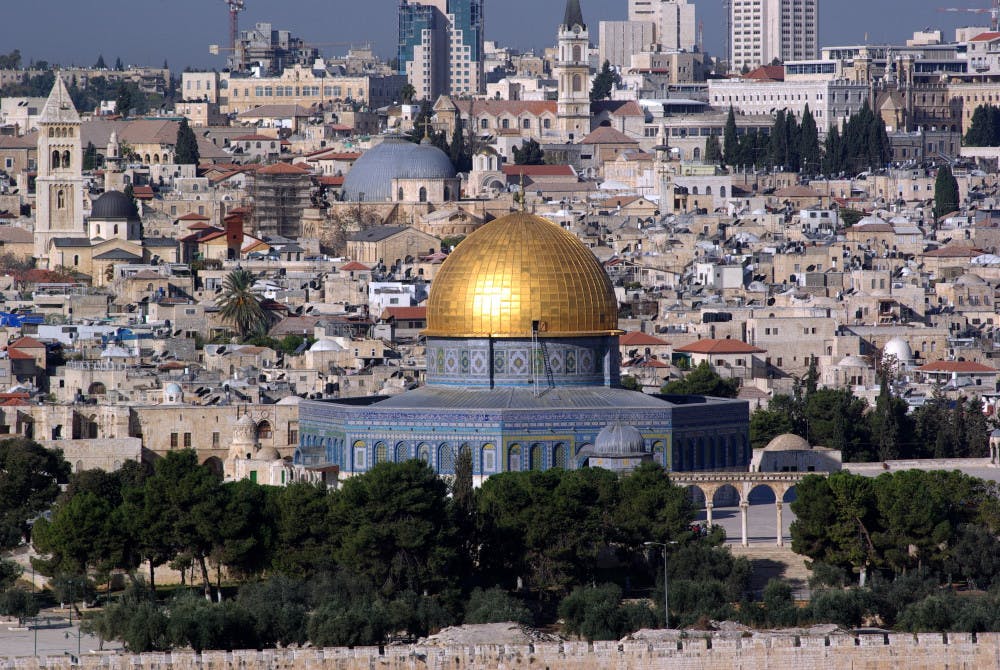On December 6, President Trump announced his decision to officially recognize Jerusalem as Israel’s capital. Eventually, steps will be taken to move the U.S. embassy there, from its current location in Tel Aviv.
Why is this so important?
For one, it reverses 20 years of American diplomatic policy. Since the Jerusalem Embassy Act of 1995 was enacted by Congress, U.S. presidents have had a choice: recognize Jerusalem as the capital of Israel and move the U.S. embassy there, or delay the decision.
This choice has come up every six months since its 1995 passage, and each president has signed a waiver pushing the decision back another six months, according to Time.
Until now, that is.
In a statement delivered this week, Trump said he was delivering on a promise made during the 2016 presidential campaign.
“I've judged this course of action to be in the best interests of the United States of America and the pursuit of peace between Israel and the Palestinians,” Trump said, in the statement. “This is a long-overdue step to advance the peace process and to work towards a lasting agreement.”
He continued to say that recognizing Israel is a sovereign nation and has a right to choose its own capital is “a necessary condition for achieving peace.”
And this brings up the second major point of importance: the Israeli-Palestinian conflict goes back decades. At the center of this conflict is the city of Jerusalem, an important center in Christianity, Islam and Judaism.
The city was divided by an armistice border in 1949, which gives Israel control of the western half of the city (Here's a good explanation from CNN). The eastern half, called the ‘Old City,’ includes the incredibly sensitive religious sites and was officially put under Palestinian control.
Israeli forces occupied the eastern part of Jerusalem after the Six Day War and later annexed it in 1980. Palestine claims Eastern Jerusalem as the capital of a future Palestinian state. Israel claims Jerusalem as its capital.
After Trump’s announcement, the U.S. becomes the first country to recognize Jerusalem as Israel’s capital.
The decision sparked criticism from world leaders.
"Jerusalem: France does not approve the US decision. France supports the Two-State Solution, Israel and Palestine, living in peace and security, with Jerusalem as the capital of both States. We must prefer appeasement and dialogue"
➖ President Emmanuel Macron https://t.co/mN7rzqbj0o
— France Diplomacy🇫🇷 (@francediplo_EN) December 6, 2017
PM: "We disagree with the US decision to move its embassy to Jerusalem and recognise Jerusalem as the Israeli capital before a final status agreement." Full statement: https://t.co/TEPAn7fX2U
— UK Prime Minister (@Number10gov) December 6, 2017
There is no alternative to the two-state solution: two states living side-by-side in peace, security and mutual recognition – with Jerusalem as the capital of Israel and Palestine. pic.twitter.com/r95LPIZimg
— António Guterres (@antonioguterres) December 6, 2017
Peace accords between Israel and Palestine from 1993 said the decision regarding Jerusalem’s place would be left for the end of the peace process. This decision to have it come at the beginning is being widely criticized, even being called a “kiss of death” for peace talks by the Palestine Liberation Organization’s chief representative in Washington, reports Reuters.
Many are saying this has “disqualified” the U.S. from having a role in the peace talks going forward, as reported by Al Jazeera.
Many Israelis, on the other hand, praised Trump for his decision. Prime Minister Benjamin Netanyahu said Israelis were “profoundly grateful for his [Trump’s] courageous and just decision” in recognizing Jerusalem as the capital.
This is a historic day. Jerusalem has been the capital of Israel for nearly 70 years. Jerusalem has been the focus of our hopes, our dreams, our prayers for three millennia. Jerusalem has been the capital of the Jewish people for 3,000 years. Thank you, @realDonaldTrump! 🇮🇱🇺🇸 pic.twitter.com/mWCUpUMpiC
— Benjamin Netanyahu (@netanyahu) December 6, 2017
In the days after the decision, protests erupted across the Gaza Strip and the West Bank. Palestinians went on strike and, in the latest report by BBC, at least 200 had been reported injured and at least four killed in clashes with peacekeeping troops deployed by Israel.
In the days leading up to the decision, world leaders warned against the drastic shift of position. Pope Francis, among others, called for “the status quo” of the situation, in keeping with United Nations resolutions concerning the status of Jerusalem, to be respected.
#UPDATE Pope Francis defends the "status quo" of Jerusalem, ahead of an announcement by US President Trump in which officials say he will recognise the disputed city as Israel's capital https://t.co/fsuPRY0GMu pic.twitter.com/NPvaTMviD9
— AFP news agency (@AFP) December 6, 2017
Palestinian groups called for "three days of rage" in protest to the decision, according to the Jerusalem Post.
Demonstrations and protests are ongoing across the world with no end in sight, from Beirut, to Cairo, to Jakarta, reports the BBC.





